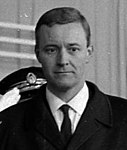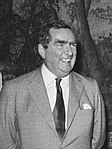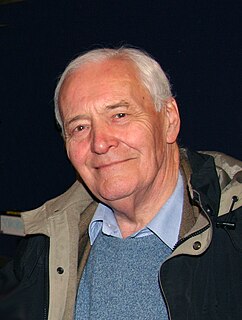
Roy Harris Jenkins, Baron Jenkins of Hillhead,, was a British Labour Party, SDP and Liberal Democrat politician, and biographer of British political leaders.
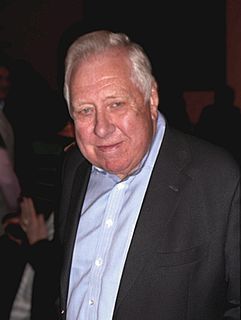
Roy Sydney George Hattersley, Baron Hattersley, PC, FRSL, is a British Labour politician, author and journalist from Sheffield. He was MP for Birmingham Sparkbrook for 33 years from 1964 to 1997. He served as Deputy Leader of the Labour Party from 1983 to 1992.

Denis Winston Healey, Baron Healey,, was a British Labour Party politician who served as Secretary of State for Defence from 1964 to 1970, Chancellor of the Exchequer from 1974 to 1979 and Deputy Leader of the Labour Party from 1980 to 1983.

The February 1974 United Kingdom general election was held on the 28th day of that month. The Labour Party led by former Prime Minister Harold Wilson made moderate gains, but was short of an overall majority. The Conservative Party led by incumbent Edward Heath lost 37 seats, but achieved a slightly higher share of the vote than Labour. This resulted in a hung parliament; Heath resigned when he found himself unable to form a coalition, and Wilson became Prime Minister for a second time. Labour won 301 seats, 17 short of a majority.

Charles Anthony Raven Crosland, also known as Tony Crosland or C. A. R. Crosland, was a British Labour Party politician and author.
Eric Graham Varley, Baron Varley, PC was an English politician and former Cabinet Minister on the right wing of the Labour Party.
Eric Samuel Heffer was a British socialist politician. He was Labour Member of Parliament for Liverpool Walton from 1964 until his death. His working-class background and consciousness fostered his left-wing politics. With 12,000 books in his home, he also admitted to being a bibliophile. Due to his experience as a professional joiner, he made a speciality of the construction industry and its employment practices, but was also concerned with trade union issues in general. He changed his view on the European Common Market from being an outspoken supporter to an outspoken opponent, and served a brief period in government in the mid-1970s. His later career was dominated by his contribution to debates within the Labour Party and he defended the Liverpool City Council.

The 1980 Labour Party leadership election was held following the resignation of James Callaghan. Callaghan had been Prime Minister from 1976 to 1979 and had stayed on as leader of the Labour Party for eighteen months in order to oversee an orderly transition to his favoured successor, Denis Healey over his own deputy Michael Foot. However, during this period the party had become bogged down in internal arguments about its procedures and future direction.

The 1988 Labour Party leadership election saw Tony Benn, identified with the left wing of the British Labour Party, challenge the incumbent leader Neil Kinnock identified with the more moderate social democratic wing.

The 1963 Labour Party leadership election was held following the death of Hugh Gaitskell, party leader since 1955. He died on 18 January 1963 and was succeeded by deputy leader George Brown.
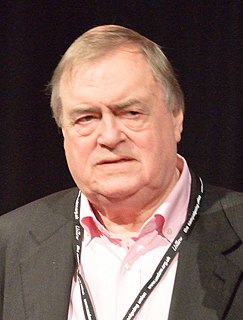
A deputy leadership election for the Labour Party in the United Kingdom took place in 1994, after the sudden death of incumbent leader John Smith. Margaret Beckett was the serving Deputy Leader of the Labour Party, having been elected in 1992, and following Smith's death became the acting leader. On 25 May she announced that a contest for the deputy leadership would take place alongside the leadership election, which allowed her to stand for both positions.

The 1981 Labour Party deputy leadership election took place on 27 September 1981 when Tony Benn unsuccessfully challenged the incumbent deputy leader Denis Healey at the party conference. Healey had been elected unopposed as deputy leader in the previous year.
The Manifesto Group was a parliamentary alliance of British Labour MPs led by Dickson Mabon, who were opposed to what they perceived to be the leftward drift of the Labour Party in the 1970s.
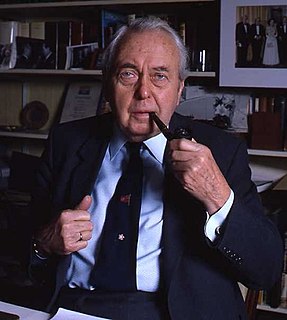
Harold Wilson of the Labour Party would form his Second Shadow Cabinet, as Leader of Her Majesty’s Most Loyal Opposition, after losing the 1970 general election to Conservative Edward Heath. He would retain leadership of the Opposition for the length of the Heath Ministry, from 1970 − 1974. In February 1974, his party would narrowly win an election. Wilson was then forced to form a minority government, which would only last until another election in October of that year. After that election, Wilson would form a majority government, known as the Second Wilson Ministry.

The 1972 Labour Party deputy leadership election took place in April 1972 after Roy Jenkins resigned as deputy leader over the decision to hold a referendum on Britain's entry into the Common Market.

The 1971 Labour Party deputy leadership election took place in November 1971 after left-wingers Michael Foot and Tony Benn challenged sitting deputy leader Roy Jenkins.

The 2015 Labour Party deputy leadership election was triggered on 8 May 2015 by the resignation of Harriet Harman as Deputy Leader of the Labour Party of the United Kingdom following the party's defeat at the 2015 General Election. Harman, the Deputy Leader of the Labour Party, became Acting Leader following Leader Ed Miliband's resignation. Harman announced on the same day that she would step down as Deputy Leader, with her resignation taking effect when the new Leader and Deputy Leader are elected.

The 1960 Labour Party deputy leadership election took place in November 1960, after the death of sitting deputy leader Aneurin Bevan.






